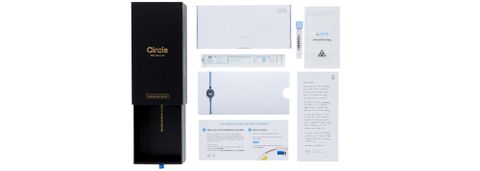TechRadar Verdict
This incredibly comprehensive package gives you an unusually detailed picture of everything from serious and life-changing medical conditions to frivolous and fun personality traits. It's not the right choice for anyone wanting to research their heritage as the data currently isn't great, but it does include a lifetime subscription to updates as it improves. It's expensive, but you get a heck of a lot of information, which is very well presented and easy to understand.
Pros
- +
Incredibly detailed
- +
Good mix of serious and fun data
- +
Includes lifelong updates
Cons
- -
Pricey
- -
Weak ancestry results
- -
DNA is not the only factor for many traits
Why you can trust TechRadar
The market for home DNA testing is getting crowded. A few years back, there were only one or two main contenders even in the biggest geographical areas. Now, there are loads to choose from, all touting different benefits and making grand claims about what is still an emerging service.
In this hyper-competitive and hype-heavy atmosphere, newcomers to the market need to find a point of difference from established market leaders with high brand recognition, like 23&Me and AncestryDNA – the former of which has recently had to make layoffs as a result of lower sales.
Surprisingly, CircleDNA – owned by Prenetics, and new to the UK after a successful launch in Hong Kong – has found its niche in being far more expensive than its competitors. But for that, it claims to be "the most comprehensive DNA test in the world".
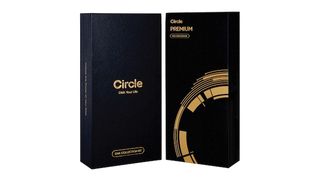
In fairness, CircleDNA does offer lower-priced tests than its £499 / $629 / AU$929 Premium service, but once you've read the blurbs, it's hard to settle for anything less. That's because the Premium product is a combination of all the lower tiers, meaning you get the Vital, Health and Family Planning packages all in one, with the addition of information about how you'll likely respond to more than 100 common pharmaceutical drugs.
The Premium test offers up to 500 reports in 20 categories. If that sounds like a lot, 'report' here just means, essentially, a single result – so 'you're probably not lactose intolerant' would count as one report.
However, the Premium product also includes a lifetime subscription to future updates, meaning you could potentially receive reports from the same DNA sample years after you supplied it, as the process improves.
The reports and categories include all the things you're likely to want out of a home DNA test: information on your health, nutritional needs, susceptibility to various diseases and conditions, even personality and talent predisposition.
The Premium test also includes a 30-minute call with a genetic counsellor and another with a genetics-trained health coach to help you put your results into context. The lower-priced tiers only include one or the other.
We tried the Premium test on two people's DNA samples to compare results and see what you get for the money. Here's how we got on.
What's in the kit?
As you'd expect considering the price, the CircleDNA collection kit looks very upscale. It comes in a larger box than many of the others, which are designed to go through letterboxes. The Circle kit is about the size of a typical smartphone box, and the stylish black and gold box is wrapped in an outer that details the types and number of reports you get in your results.
The box is sealed with a holographic sticker decorated with the DNA double helix, which is reassuring – when you're putting genetic matter into a kit, it's nice to know it hasn't been opened already.
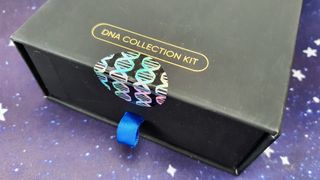
Inside, you'll find a little string bracelet thing with a washer bearing the word 'change'. This is a reference to Circle's philosophy of 'changemaking' – the company calls its (many) celebrity endorsers, mostly sportspeople, 'changemakers'. Honestly, the bracelet seems a bit excessive, but no harm done.
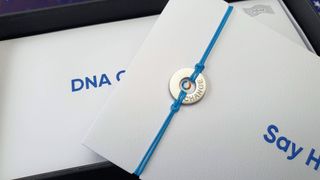
Within the actual testing part of the kit, there's a sealed swab to use (Circle uses a cheek swab rather than a tube of saliva, unlike competitors like 23 and Me), a tube to enclose it in, a sample bag to place the tube into, and a prepaid plastic envelope to send the whole thing back in.
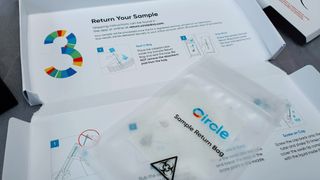
How much is the service?
Circle currently offers four tiers of DNA testing: Vital, Health, Family Planning and Premium. Each of the lower packages offers a different selection of reports, depending on which results are the most important to you.
Vital (£199 / $189 / AU$279) includes 125 reports across 14 categories, including nutrition, fitness, sleep and suchlike. The Health package (£419 / $499 / AU$759) doesn't include diet and nutrition in its 115 reports across four categories, but does have reports about cancer, dementia and other diseases. The Family Planning package (also £419 / $499 / AU$759) includes 155 reports in a single category: as you'd imagine, family planning.
The Premium package, which is the one we've sampled in this review, costs £499 / $629 / AU$929 and includes all 500 of the reports across 20 categories that the test is capable of producing.
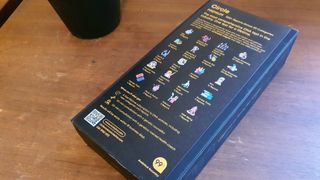
The pricing strategy is therefore curious: the Vital package is half the price of either the Health or Family Planning test but includes more reports than the former and more categories than both, and is presumably priced lower to compete with the market leaders. The Health and Family Planning options seem fairly overpriced considering you're paying three-quarters of the price of the Premium option and getting 115 or 155 reports instead of the full 500.
The Premium package is undoubtedly pricey, especially compared with the market leading home DNA tests, but the number of reports included is impressively high – in GBP, it essentially works out to £1 (about $1.50 / AU$2) per report. If you have the money to spend and want a comprehensive look at your genes, it might well be worth the price tag.
Privacy
Understandably, some people are worried about the safety of their genetic data with DNA testing companies. So far, there haven't been any specific concerns with Prenetics or CircleDNA that we're aware of, but given how new they are to the western market, that's not surprising.
The CircleDNA FAQs are reassuringly detailed when it comes to privacy and data. Especially important is the reassurance that "We do not sell, lease or rent any of your data with any third party. Only you can decide how your results are used and shared with others" and that "You can delete your account and data at anytime [sic] by emailing us at care@circledna.com."
Of course, this would mean you wouldn't receive updates to your results as the process improves in the future, but most of Circle's packages don't include that anyway.
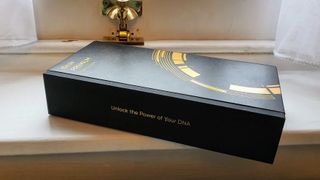
Circle hosts through Amazon Web Services (AWS), which has a specific page explaining how it's a safe choice for genomics data.
The Circle site uses SSL, and the company's data transfer systems have apparently been assessed by a third party to confirm compliance with international security standard ISO 27001.
If you're still concerned, Circle allows you to register your kit using a pseudonym rather than your real name. Samples are identified by anonymous codes in the lab in any case, and Circle states that it stores genetic data separately from your ordering information (address, credit card information and so on).
How easy is it to perform the test, and how long did it take to get results?
The first step is to register your kit, as with competing kits. You do this through the CircleDNA app, which is colorful and easy to use, although it could do with better instructions in places – we're not sure everyone knows that 'OTP' means 'one-time password' (and the fandom crowd are probably wondering why they're being asked for their one true pairing).
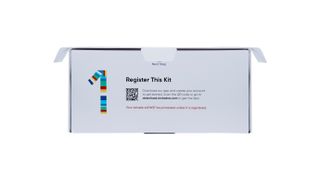
Unlike many competing kits, Circle works using a cheek swab rather than a saliva sample. This makes the collection process vastly less gross, because you just have to rub it against the inside of both cheeks 10 times rather than spit into a tube. The instructions are clear and the process is easy.
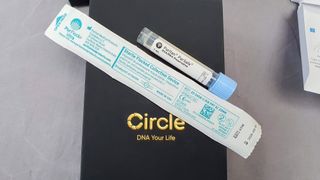
Once you've done your swabbing, you put the stick carefully into the enclosed tube (don't touch the end), break it in half, close the tube and shake it. The tube then goes into a sample bag, which goes into the prepaid plastic envelope included.
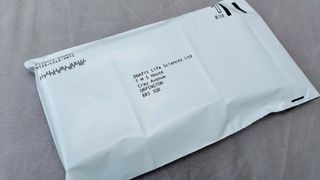
Our sample kits were both posted on December 10, and both sets of results came through on January 8. The FAQs say the process typically takes 18 working days from receipt of your sample, whereas ours took 21 working days – but that time included Christmas and New Year, which likely delayed things somewhat.
What's in the results
CircleDNA's results come in two formats: an email linking to a PDF with all your results, and the app, which breaks everything down by sections. Both are easy to navigate and understand, with colorful illustrations and straightforward language.
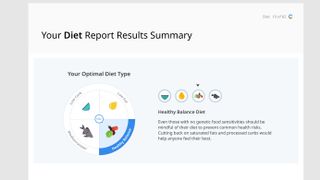
Both the app and the PDF take pains to explain how DNA testing works, and that the results aren't diagnostic – even the ones relating to specific health conditions. Rather, they show predisposition to certain traits and illnesses, while environment and lifestyle also have significant effects. This is refreshing, because genes are often spoken of as if they're some kind of 'recipe' for everything you are, which is not the case.
For the Premium test, the amount of data in the results is quite staggering (in a good way), and it takes a while to go through it all. Analytical types can quite easily lose days reading and learning. However, while the PDF and app both contain your results, there's a lot more detail in the app, so we'd advise looking there when you first read your reports to get the relevant context.
For instance, one of the reports in the Diet category is called 'theophylline sensitivity'. The PDF just shows whether you have a normal or high sensitivity, and no further information. The same portion of the app has three tabs. The first shows your sensitivity level, explains your results, tells you what theophylline is (a byproduct of caffeine) and explains potential risks.
The second tab offers recommendations for lifestyle changes based on your results, and includes some trivia about theophylline.
The third tab, 'scientific details,' shows which specific genes were tested, the confidence score for the outcome given, and a list of references. This is why you might need to put serious time aside to go through your results – there's a ton of information here, and while most of it is just nice-to-know rather than essential, for biology geeks and Quantified Self types, it's fascinating.
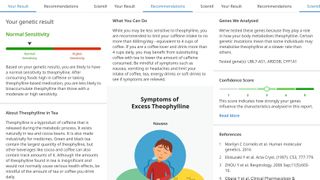
If you just want a more at-a-glance summary of your results, the PDF is ideal, especially since everything is shown with color-coded and easy-to-interpret graphics.
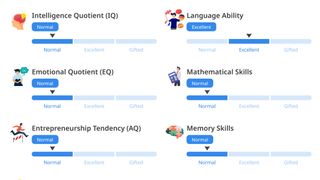
The reports are organized under headers in the app: Diet & Lifestyle, Talents & Sports Performance, Discover Your Origins, Explore Your Genetic Blueprint, Protect Your Family, Early Detection, Health & Disease and Precision Medicine. Some of those headers have lots of subcategories you can scroll through – Talents & Sports Performance includes Sports & Fitness, Success Traits and Music & Dance, for instance – while some only have one or two.
While many of the reports are similar to those found in competing products, particularly in terms of health and diet (like finding out if you're predisposed to certain types of cancer, or Alzheimer's), some of CircleDNA's results feel more actionable. This is apparently intentional, with the aim of the product to help people live 'optimized' lives based on their genetic makeup.
This, of course, is easier with some categories than others. The results recommend I eat a Mediterranean diet, which I've been researching since getting my report. However, our second test subject, Alex, was just told to eat a 'healthy balance', which could apply to anyone.
The nutrition results are particularly actionable. I found out that I have higher-than-average needs for magnesium, some types of omega-3, vitamin D and vitamin B6. As a result, I've started supplementing my diet, and although it's probably placebo, I do feel better for it. Alex reports similar, having started supplements as a result of his tests too.
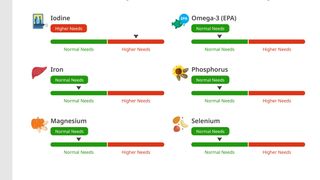
Some of the health and disease results are also potentially actionable. Mine correctly showed that I'm a carrier for two heritable diseases, which would be good to know if I were planning children. Circle also caught a third heritable disease that other tests up to now haven't flagged.
Interestingly, sometimes carriers for genetic diseases can have some symptoms of the disease, even though they don't have the full-blown version. For instance, I'm a cystic fibrosis carrier and have some mild lung problems as a result.
Where this became really useful – and probably worth the price by itself – was in Alex's results, where he found out he's a carrier for a condition he'd never heard of. Considering Alex suffers from ME (or chronic fatigue syndrome) and one of the main symptoms of the disease he carries is significant fatigue, this is something he can take to his medical team and investigate further.
Since ME is one of those frustrating conditions that often seems to have no cause, this is a real help, and one Alex wouldn't have been told about with a less comprehensive or more ancestry-focused test.
Some of the reports seem less serious and more for fun and talkability – for instance, your dancing and musical abilities. These less important categories tended to give surprising results more often than the more measurable ones – for instance, Alex's 'likely lactose intolerant' result can be checked against the fact that he is, indeed, intolerant to lactose – but how do you quantify whether you're innately gifted with music?
Both Alex and I apparently are, but neither of us plays an instrument, and neither of our childhood musical endeavours went anywhere. No one who saw five-year-old me drag herself up onto the concert piano stool by her elbows, pressing many discordant keys at the same time, would have called me 'gifted'.
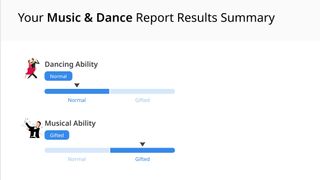
The fact that some of the results seem incorrect isn't surprising, because they're a predisposition rather than a certainty. For instance, my spice tolerance is apparently normal, but even the mildest chicken at Nando's is too much for me. That said, both Alex and I should apparently have Prince Charles-style protruding ears, and neither of us do, which is a little harder to explain. Perhaps we spent a lot of time sleeping on our sides as babies.
We're not alone in finding some of the results eyebrow-raising, though: Prenetics' own head of product, Andrew Steele, didn't have the DNA marker for being an elite athlete in his results. For an Olympic medallist, that's somewhat surprising.
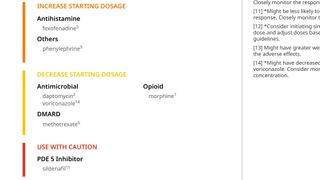
One of the most unusual and interesting parts of CircleDNA's results is the Drug Response section. It takes you through a selection of common pharmaceutical drugs and uses your genes to assess how you might respond to them. For instance, I should apparently use a lower starting dose of opioids including fentanyl, but that's probably good advice for a lot of people. I'll keep the information on hand, but I'm not convinced a healthcare practitioner would take any notice of the results if I flagged them when receiving a prescription.
The risk here, of course, is that people mess with their dosages without speaking to a professional – but to be fair to Circle, it does repeatedly remind you to do that. Don't start taking higher doses of things just because your DNA said so, okay?
What’s the sample size, and how closely do the results match your heritage?
A big point of difference for CircleDNA is that the company uses whole exome sequencing rather than the less detailed genotyping process, meaning it looks at around 1% of your genome. If that sounds low, it's actually higher than many home DNA testing companies use, and encompasses 31 million data points.
Your exome is the part of your genome made up of exons, which are protein encoders. Considering any unrelated pair of humans will share somewhere between 99.5% and 99.9% of their DNA (estimates vary), 1% is more than enough to work out what makes you, you.
The heritage portion of Circle's results is the weakest overall. Comparing my results to the ones I received through Ancestry and 23AndMe, Circle's data is noticeably poorer.
Had this been the only DNA test I'd taken, I would never have learnt about my Jewish ancestry, which I discovered through 23AndMe and confirmed through genealogical research. This did not appear on my CircleDNA results, which have me as 99% European and 1% South Asian.
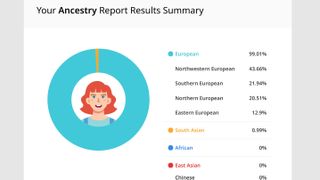
Similarly, Alex's results are missing important information – his mother is from a central American country, and Hispanic ethnicities aren't represented in Circle's 15 ancestry compositions:
East Asian
- Chinese
- Western Minority
- Northern Han Chinese
- Southern Han Chinese
- Southern Minority
- Northern Minority
- Japanese and Korean
Southeast Asian
- Vietnamese
- Indonesian, Thai, Malaysian, Filipino, Cambodian and Burmese
African
European
- Eastern European
- Northern European
- Northwestern European
- Southern European
Middle Eastern
South Asian
The bias towards Asian descent is likely because of Circle's own heritage, with the test having made it big in Hong Kong before expanding elsewhere. At first it seemed that it may also be due to a relatively small sample size, though this turned out not to be the case.
When we contacted Circle about this, a spokesperson initially told TechRadar that a sample size of 2,880 is enough to "robustly infer" the 15 different ancestry compositions.
However, the firm has since clarified that the actual sample size is much higher, at 28,227: “CircleDNA reference datasets consists of two groups of datasets: 1) Individuals from publicly available datasets including the Human Genome Diversity Project, the 1000 Genomes project and Gnomad project. 2) Individuals from private CircleDNA data collections from customers who have consented to participate in research.
“In total, there are 25,347 research-consented customers and 2,880 non-customers data in the reference datasets used for ancestry estimation. The database size used for ancestry estimation will continue to grow as our research-consented customer database expands”.
Ancestry is likely to be one of the areas where Circle's analysis will improve over time, meaning that hopefully both Alex and I will receive updated results that more closely align with what we know to be true.
In the meantime, however, we wouldn't read anything at all into your Circle ancestry results, given that both of our samples had significant missing information. It's particularly frustrating that Jewish ancestry is folded into the generic 'Middle Eastern' header (though mine wasn't visible there either), and that Hispanic ancestry isn't represented at all.
What else does it tell you?
Within the Diet & Lifestyle section, there's a really useful portion on Stress & Sleep. This tells you things like your genetic risk of sleep apnea (although environmental factors are also very important), how deeply you're likely to sleep and how much you move around, whether you're a morning lark or night owl, how well you tolerate stress and how likely stress is to make you fat.
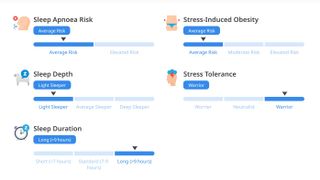
While, again, these are just predispositions, they can be quite empowering – it felt good to hear that I'm a 'warrior' at dealing with stress, and therefore might be self-fulfilling. It's also good to know how much sleep your DNA says you need – more than nine hours in my case. I told you, mum.
Verdict
CircleDNA's Premium package is a comprehensive look at your genetic makeup, from the serious – propensity to various diseases and conditions – to the more superficial, like how good you (innately) are at dancing and maths.
The results are presented in an easy-to-understand format, with the app encouraging deep dives to find out more about each report. It's straightforward to see what your results are and what that means, and there are lots of actionable insights that can help you improve your life based on your genes. (Although, again, it's far from the only factor you should consider. If the app says you're less likely to get addicted to cigarettes, that's not an indication that you won't, or that it's a great idea to start smoking.)
CircleDNA is let down by its weak Ancestry results, but since Premium includes a lifetime subscription to test improvements, hopefully this will be rectified and previous testers will receive updates that more accurately reflect their heritage.
For analytical types, the CircleDNA Premium package is the dream – a huge, detailed, science-backed report on your genes, with lifelong updates as the data improves. It's pricey, but if you want to know as near to everything as you can right now, this is your DNA test.
